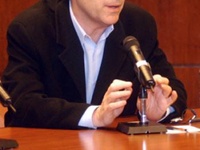
Dillon Professor of the Crivilization of France STANLEY H. HOFFMANN says the U.S. policy on Iraq is detrimental to future foriegn relations.
On the eve of President Bush’s deadline for Iraqi President Saddam Hussein to back down, Harvard’s professors stand divided.
Some steadfastly back Bush, while others remain categorically opposed to a war.
Most though fall somewhere in between, with complex views that aren’t easily predicted by discipline, experience or even past political position.
“We think about it all the time, we talk about it, but it’s hard to encapsulate,” says Professor of History Cemal Kafadar, an expert on the Middle East.
At the Kennedy School of Government, though Dean Joseph S. Nye has openly stated his support of the war, his colleagues—many of whom have been traversing the country consulting on the conflict—are divided.
“The debate over war is split right down the middle,” Michael Ignatieff, director of the Carr Center of Human Rights Policy at the Kennedy School says of the likely war.
And over in Harvard Yard, the war has been equally polarizing, with opinions over the precedent of unilateral American action largely determining on which side of the conflict professors fall.
Disgust with what they perceive as “American imperialism” is among the most voiced reasons for opposition.
“Bush has managed to transform a debate on how to deal with Iraq into a debate on how to deal with American power,” says Stephen M. Walt, an academic dean and Belfer professor of international affairs at the Kennedy School. “This is an enormous failure of American diplomacy.”
Professor of the History of Science Everett I. Mendelsohn, a member of the Faculty Initiative for Peace and Justice that was formed a month ago to combat the war through diplomatic means, is equally critical of American tactics.
“The fundamental issues of diplomacy have been overlooked,” he says. “[The administration] has no idea what diplomacy means.”
Dillon Professor of the Civilization of France Stanley H. Hoffmann also says that the impending intervention is unnecessary and will prove devastating to America’s international reputation.
“We are passionately poisoning our relations with the world,” Hoffman says. “It is a complete violation of international law.”
Yet many of those in support of the war argue that invoking “international law” is no longer a legitimate means of confronting Saddam’s regime.
“If someone is so egregiously in violation of 17 U.N. resolutions, the notion of international law or world opinion is a joke,” said Winthrop Professor of History Stephen A. Thernstrom.
Read more in News
Top Israeli Official Talks Policy













